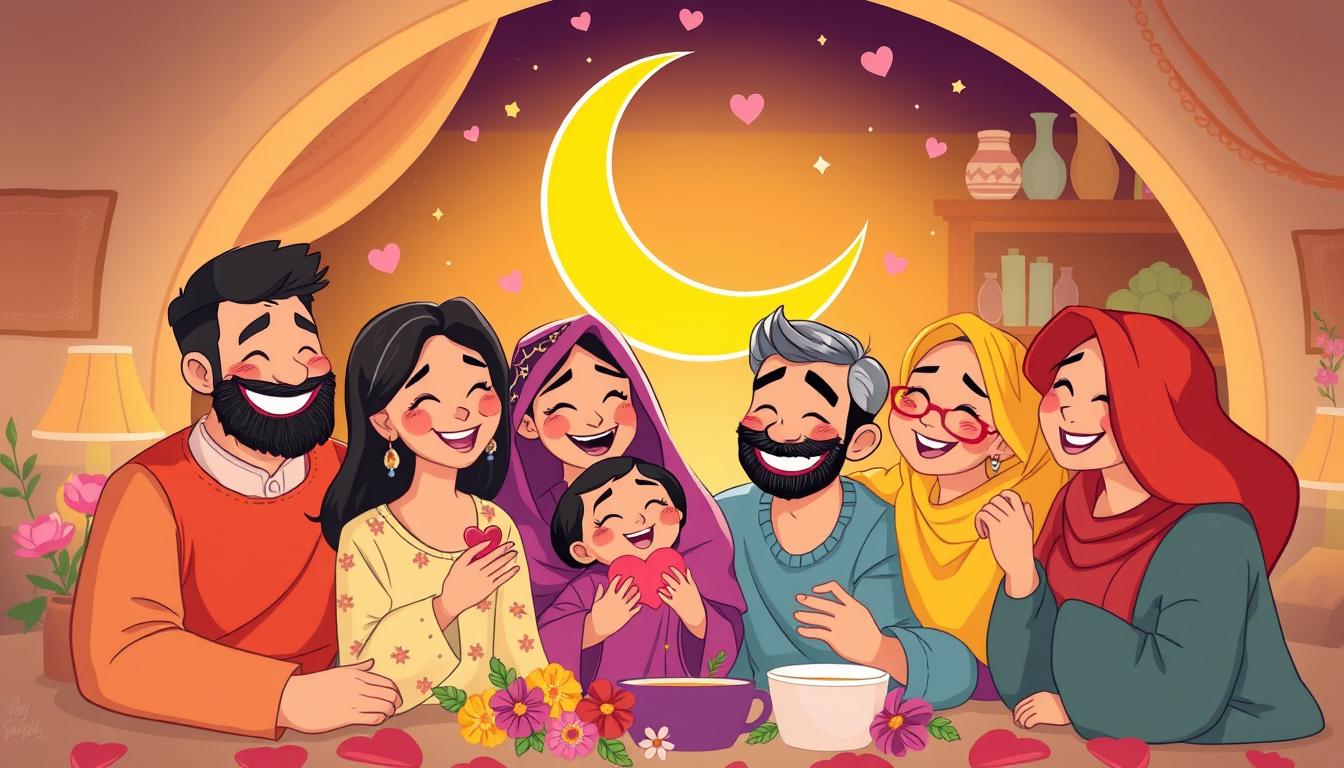Did you know that in Islam, family is seen as a blessing? It brings happiness and stability to individuals. At Umar Khan Charity Organization, we value family and community. We work to support and empower them through our charity.
The Quran and Hadith teach us about family values. They stress the importance of love, respect, and unity. By learning from Islamic Hadith on Family, we can create stronger, more united families and communities.
Exploring family in Islam, we see its great importance. We’ll look at the roles of parents, spouses, and children in creating a loving home. We’ll also see how Family Values in Hadith help with emotional support, comfort, and wisdom. These values lead to happiness for individuals and the community.
Key Takeaways
- Family is a blessing in Islam, contributing to individual happiness and stability.
- Cohesive Muslim families are linked to stronger communities, impacting social dynamics positively.
- Emotional support from families is emphasized, facilitating comfort during crises and joys.
- Parents play a vital role in passing on moral and spiritual values. This directly affects children’s behaviors and beliefs.
- Islamic Hadith on Family provides guidance on building stronger, more harmonious families and communities.
- Family Values in Hadith promote love, respect, and unity, essential for individual happiness and community well-being.
- Hadith About Family emphasizes the importance of nurturing a supportive and loving environment.
Importance of Family in Islam
We understand how vital family is in Islamic communities. Our charity work aims to support families. The Quran and the Prophet Muhammad’s teachings highlight family’s role in society.
The Prophet Muhammad Hadith Family teachings are key to understanding family values. The Prophet Muhammad (s) made family a priority in his final days. He emphasized the importance of family ties.
Understanding Family as a Social Unit
Family is the foundation of society, and Islam promotes marriage as a way to complete one’s faith. The Prophet said, “he who marries has completed half his religion.” Here are some points on family’s importance:
- Maintaining family ties is second only to faith in Allah’s love.
- Breaking family bonds is considered a major sin, next to disbelief.
- Showing kindness to family members earns divine rewards and mercy.
The Role of Family in Islamic Communities
In Islamic communities, family shapes our values and beliefs. Hadith Quotes on Family guide us in nurturing our families. The Prophet’s teachings show the balance between worship and family duties.
Key Hadith on Family Values
We believe in the importance of love and compassion in family relationships. Our charitable work aims to promote these values. The Hadith guides us on family values, showing the importance of love, compassion, and responsibility.
A stable family environment is key to our well-being. It helps us grow kindness and compassion. The Prophet Muhammad (S.A.W.W.) said, “The whole world is pleasure, and the best pleasure of the world is the righteous woman.” This shows how a righteous spouse is vital for a happy family.
Love and Compassion Among Family Members
The Quran talks about the importance of family for the human race. It says men and women come from one soul. This shows the unity of families.
The Quran also says, “Your women are a tillage for you,” highlighting their role in family. It compares spouses to garments, showing their closeness and beauty in each other.
Duty and Responsibility to One’s Family
Hadith about Parents and Children stresses the need for responsibility in families. The Prophet said a stable family is key to our emotional well-being. He also said raising children is a big job, with no school or institution better than family.
The Quran tells us to protect our family from harm. It urges us to pray together. Family members must support each other financially, with the husband responsible for the family’s upkeep.
Family support is a duty, with zakat helping the poor in our families first. A hadith says our wealth belongs to our family, encouraging us to support each other. By following the Prophet Muhammad (S.A.W.W.) and the Quran, we can build strong, loving families.
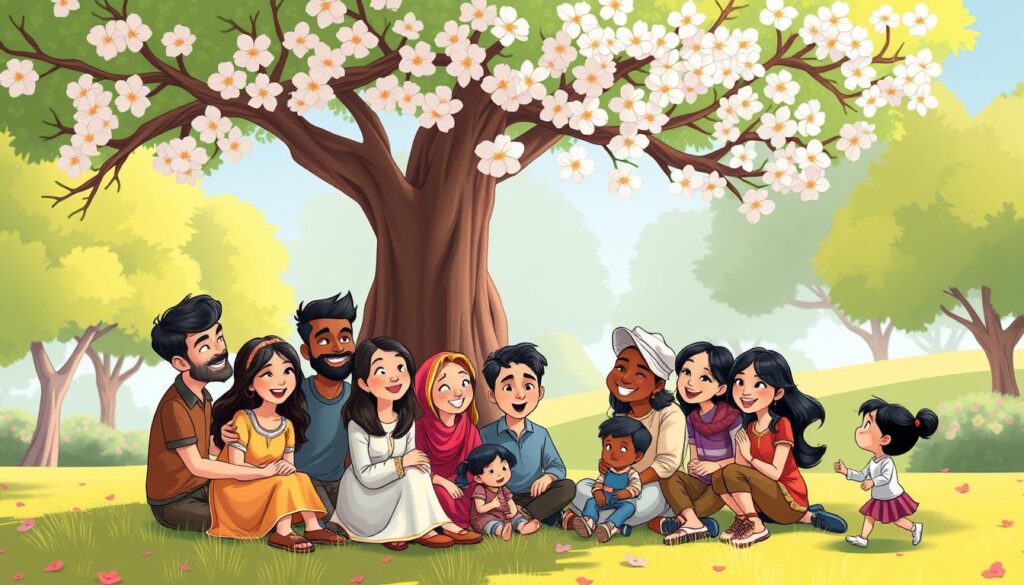
| Family Values | Importance |
|---|---|
| Love and Compassion | Promotes psycho-emotional stability and kindness |
| Responsibility and Duty | Emphasizes the importance of protecting family members from harm |
| Economic Obligations | Highlights the significance of mutual support among relatives |
The Prophet Muhammad’s Teachings on Family
We know how vital kindness, respect, and sibling bonds are in families. We aim to spread these values through our charity work. The Prophet Muhammad’s teachings guide us on family ties, stressing the need for kindness, respect, and sibling love.
Reflecting on Hadith about Siblings and Hadith about Relationships, we see the value of Family Values in Islam. The Prophet Muhammad (ﷺ) showed love and affection, like hugging and kissing his grandkids and holding his wife’s hand while traveling.
Exemplifying Kindness in the Home
Key ways to show kindness at home include:
* Spending quality time with family
* Showing thanks and appreciation
* Encouraging open talks and listening well
Respecting Parents and Elders
The Prophet Muhammad taught patience and understanding. He never yelled at family. We can follow his example by treating our parents and elders with respect and kindness.
Importance of Sibling Relationships
Hadith about Siblings shows how important sibling bonds are in Islam. The Prophet Muhammad taught us to be kind, respectful, and compassionate to our siblings. We work to promote these values in our charity efforts.
The Role of Mothers in Islam
We understand how vital mothers are in Islamic families. Our charity work aims to support them. The Quran and Hadith guide us on their roles and responsibilities. A key Hadith about Mothers says “Paradise lies under the feet of Mothers”. This shows how much mothers are valued in Islam.
In Islamic families, Family Values in Islam are deeply rooted. Mothers are key in teaching these values to their children. The Quran says it takes about 30 months to bear and wean a child. This shows the huge investment mothers make physically and emotionally. 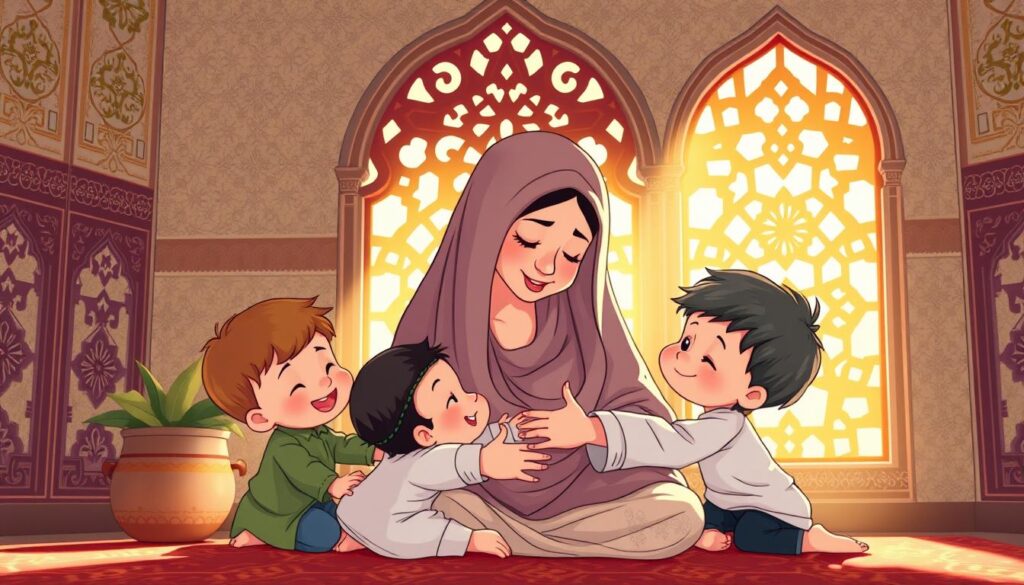
The teachings of the Prophet Muhammad and the Quran stress respecting and caring for mothers. A key part of Islamic Hadith on Family is how we address our parents. It teaches us not to show even a hint of irritation. This shows how much mothers are respected and should be treated with kindness.
| Islamic Teachings | Significance |
|---|---|
| Paradise lies under the feet of Mothers | High regard for mothers |
| Bearing and weaning a child takes 30 months | Significant physical and emotional investment by the mother |
By following these Family Values in Islam, we can build stronger, more loving families. This leads to a more united society.
Family Unity and Connection
We believe family unity and connection are key. Our work aims to support these values. “Silat ur-rahm,” or keeping family ties, is a big part of Islamic teachings. It shows how important family bonds are.
The Quran talks about keeping family ties 23 times. This shows how much it values family unity. The Prophet Muhammad said breaking family ties is unacceptable in Islam. He warned of severe consequences for those who do.
Strengthening Bonds Through Shared Activities
Doing things together is great for family bonds. Here are some ideas:
- Participating in charitable work together
- Engaging in regular family gatherings and meals
- Encouraging open communication and active listening
These activities help families feel closer and more united. They create a positive and supportive home environment.
Importance of Open Communication
Open communication is essential for family unity. The Hadith about Family Unity stresses honesty and truthfulness. These are key for a strong family bond.
By talking openly and respectfully, families can trust each other more. This leads to a more harmonious and supportive home.
Conflict Resolution Within the Family
We know how important it is to solve conflicts in families. Our charity work aims to teach these values. The Hadith guides us on how to resolve family conflicts, like seeking forgiveness and understanding.
Most family fights start from not understanding each other, with about 70% of disputes. Differences in values cause about 30% of fights. Financial problems and outside pressures add to family stress in about 50% of cases.
Seeking Forgiveness and Understanding
Forgiveness and understanding are key to fixing family fights. Forgiving can make family bonds stronger by up to 70%. Here are some key points about solving family conflicts:
- Mediation can solve 80% of family disputes.
- Good communication can lower conflict chances by 60%.
- Family counseling can help 75% of families find peace after conflicts.
Hadith on Patience and Tolerance
The Hadith teaches us to be patient and tolerant in solving conflicts. These values help families live in harmony. As we focus on Family Values in Islam, we see how Hadith about Conflict Resolution guides us.
By following Islamic Hadith on Family, we aim to build stronger families. Our charity supports families in learning to solve conflicts. We want to help them be patient, tolerant, and understanding.
| Conflict Resolution Strategies | Success Rate |
|---|---|
| Mediation | 80% |
| Family Counseling | 75% |
| Effective Communication | 60% |
The Significance of Marriage
Exploring the importance of family in Islam leads us to marriage. It’s seen as an act of worship that meets personal and communal needs. The Hadith about Marriage stresses the importance of picking a life partner. Islamic Hadith on Family also points out the need for mutual respect and kindness in marriage.
Islamic teachings say marriage helps keep faith strong by encouraging good behavior and fighting temptation. The Quran says a good marriage is peaceful, loving, and full of mercy. These signs guide us. We value marriage and family in Islam and help couples through our charity work. We promote Family Values in Islam like compassion, patience, and humility.
Some key aspects of a successful marriage in Islam include:
- Choosing a life partner with good character and faith
- Showing mutual respect and kindness
- Guarding chastity and avoiding immoral behavior
- Providing a peaceful and stable environment for spouses
By following these principles and values, couples can build a strong and harmonious marriage. This is the base for a stable family and a peaceful society. The Prophet Muhammad (peace be upon him) said marriage is a strong and noble covenant in Allah’s sight. We should try to keep its importance in our lives.
Parenting in Islam
We understand the vital role of parenting in Islamic families. Our charity work aims to support parents. The Quran and Hadith guide us on raising children with Islamic values. They stress the importance of constant prayer, believing it’s when prayers are most likely to be answered.
Islamic teachings emphasize kindness in parenting. A hadith from Aishah says: “Verily Allah loves kindness in all things.” This shows kindness is key in raising children in Islam. You can learn more about parenting techniques in Islam and raising children with faith.
The Prophet (blessings and peace be upon him) said: “Whoever is deprived of kindness is deprived of goodness.” This shows kindness is vital for good behavior. A supportive environment is critical, as it helps Muslim families. Family values in Islam shape children’s character, making them responsible and compassionate.
Here are some key points for parenting in Islam:
* Spend quality time with your children and engage in activities that promote bonding and learning.
* Provide a supportive environment that encourages positive behavior and discourages negative actions.
* Teach your children about Islamic values and principles, and lead by example.
* Encourage your children to ask questions and seek knowledge, and provide guidance and support when needed.
* Foster a sense of community and social responsibility in your children, and encourage them to participate in charitable activities.
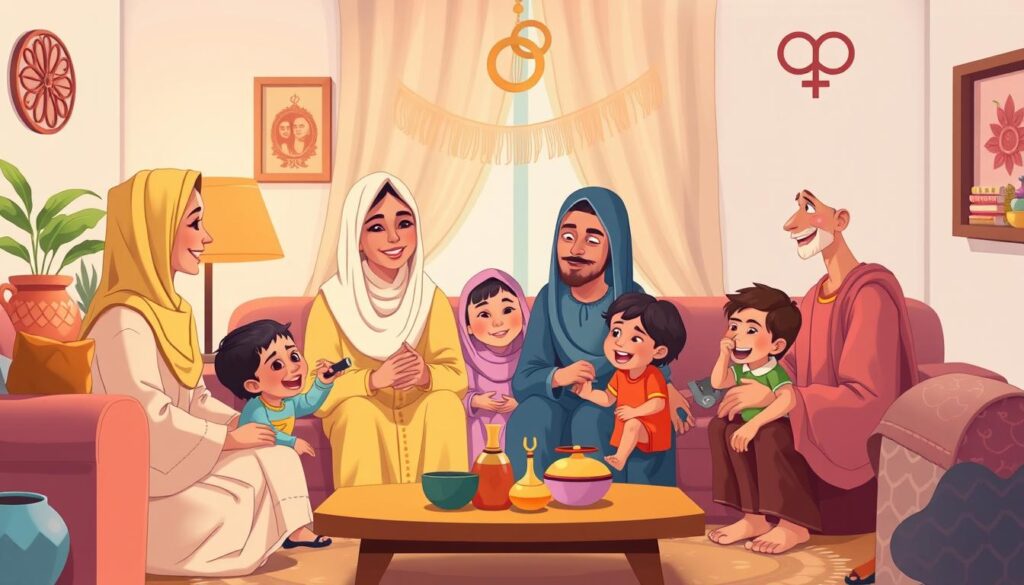
Building a Supportive Family Environment
We believe in the importance of building a supportive family environment. We strive to promote these values through our charitable work. A Hadith about Family Environment guides us in creating a safe space for open discussion. It encourages personal growth and development.
Islamic Hadith on Family highlights the importance of family values in Islam. These values include love, respect, and unity. By fostering these values, we can create a nurturing environment for family members to thrive. Key aspects of building a supportive family environment include:
- Creating a safe space for open discussion and communication
- Encouraging personal growth and development
- Practicing empathy and understanding towards each other
By following these principles, we can build strong and supportive family relationships. These relationships are essential for our emotional and spiritual well-being. As we strive to create a supportive family environment, we are reminded of the importance of Family Values in Islam. These values emphasize mutual respect, trust, and cooperation among family members.
Extended Family Dynamics
We know how key extended family is and work to help families through our charity. The Quran and Hadith guide us on family ties, including the role of grandparents. They teach us the importance of family unity and working together.
In Islamic families, Islamic Hadith on Family shows grandparents as sources of wisdom and love. They help pass down cultural and religious values to the young. Keeping in touch with relatives strengthens family bonds and creates a sense of community.
Some key aspects of extended family dynamics in Islam include:
- Maintaining respect and obedience to parents and elders
- Showing compassion and kindness to all family members
- Preserving family ties and relationships
By following Family Values in Islam, we can make our families more harmonious and supportive. As Umar Khan Charity says, extended family is vital in Islam. Learning from the Hadith about Extended Family and Islamic Hadith on Family helps us understand their importance.
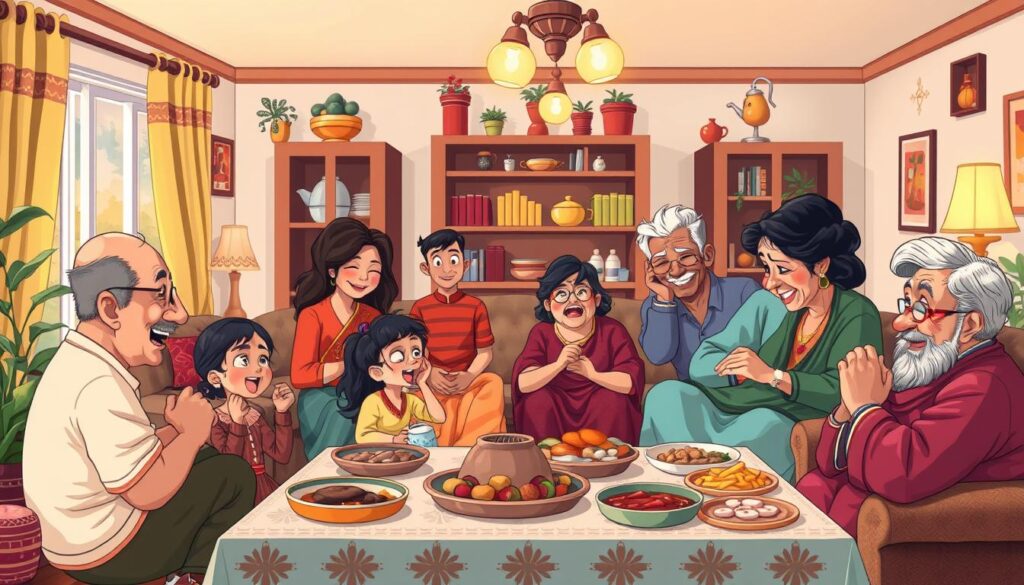
Family as a Source of Blessings
We know how vital family is in our lives. The Hadith about Family Blessings shows they bring us comfort, love, and support. It also stresses the need to treat family with kindness, respect, and compassion.
Islamic teachings on Family Values remind us to value and cherish our family. They see family as a gift from Allah. We should thank and appreciate them for the blessings they add to our lives.
Recognizing Family as a Gift from Allah
Thinking about family reminds us of the Prophet Muhammad’s teachings. He stressed the importance of family bonds. We can show our gratitude by being kind, empathetic, and understanding towards them.
- Spending quality time with family members
- Showing gratitude and appreciation for their presence in our lives
- Practicing patience and understanding in our interactions with them
Gratitude and Appreciation for Family
By seeing our family as blessings, we can build unity, love, and respect at home. As we work to uphold these values, we remember the role of family in our lives. We also understand the need to care for these relationships.
Community and Family Interactions
We understand how important family and community ties are in shaping Islamic society. The Hadith and the Quran show us how vital it is to build strong bonds within our communities. They also highlight the role of the family in our lives.
The family is seen as the core of the community and a key link for future generations. It’s where children learn important things like language, values, and habits. The family is also where a child’s character is shaped, thanks to the cooperation between parents.
In Islamic teachings, families are built on love, kindness, and mutual respect. The Messenger of Allah (S) said, “Marry and take wives for this increases your means of living.” The Quran also encourages singles to get married, promising that Allah will bless them.
We believe that strong family and community interactions help us become united, respectful, and compassionate. By following the Hadith and the Quran, we aim to strengthen these relationships. This way, we contribute to the happiness and well-being of our communities.

